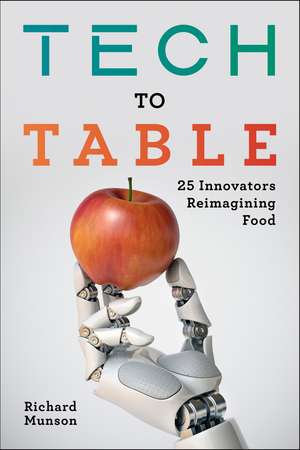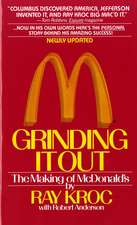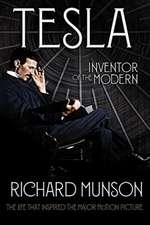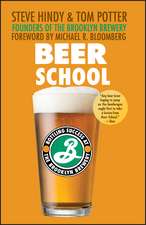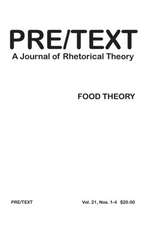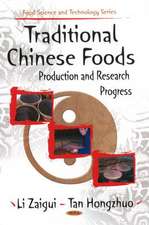Tech to Table: 25 Innovators Reimagining Food
Autor Richard Munsonen Limba Engleză Hardback – 22 sep 2021
Imagine eating a burger grown in a laboratory, a strawberry picked by a robot, or a pastry created with a 3-D printer. You would never taste the difference, but these technologies might just save your health and the planet’s. Today, landmark advances in computing, engineering, and medicine are driving solutions to the biggest problems created by industrialized food.
Tech to Table introduces readers to twenty-five of the most creative entrepreneurs advancing these solutions. They come from various places and professions, identities and backgrounds. But they share an outsider’s perspective and an idealistic, sometimes aggressive, ambition to rethink the food system.
Reinvention is desperately needed. Under Big Ag, pollution, climate change, animal cruelty, hunger, and obesity have festered, and despite decades of effort, organic farming accounts for less than one percent of US croplands. Entrepreneurs represent a new path, one where disruptive technology helps people and the environment. These innovations include supplements to lower the methane in cattle belches, drones that monitor irrigation levels in crops, urban warehouses that grow produce year-round, and more.
The pace and breadth of change is astonishing, as investors pump billions of dollars into ag-innovation. Startups are attracting capital and building markets, with the potential to upend conventional agribusiness’s stranglehold on the food system. Not every invention will prosper long-term, but each marks a fundamental change in our approach to feeding a growing population—sustainably.
A revolution in how we grow and eat food is brewing. Munson’s deftly crafted profiles offer a fascinating preview of the coming future of food.
Tech to Table introduces readers to twenty-five of the most creative entrepreneurs advancing these solutions. They come from various places and professions, identities and backgrounds. But they share an outsider’s perspective and an idealistic, sometimes aggressive, ambition to rethink the food system.
Reinvention is desperately needed. Under Big Ag, pollution, climate change, animal cruelty, hunger, and obesity have festered, and despite decades of effort, organic farming accounts for less than one percent of US croplands. Entrepreneurs represent a new path, one where disruptive technology helps people and the environment. These innovations include supplements to lower the methane in cattle belches, drones that monitor irrigation levels in crops, urban warehouses that grow produce year-round, and more.
The pace and breadth of change is astonishing, as investors pump billions of dollars into ag-innovation. Startups are attracting capital and building markets, with the potential to upend conventional agribusiness’s stranglehold on the food system. Not every invention will prosper long-term, but each marks a fundamental change in our approach to feeding a growing population—sustainably.
A revolution in how we grow and eat food is brewing. Munson’s deftly crafted profiles offer a fascinating preview of the coming future of food.
Preț: 209.18 lei
Nou
Puncte Express: 314
Preț estimativ în valută:
40.03€ • 41.64$ • 33.05£
40.03€ • 41.64$ • 33.05£
Carte disponibilă
Livrare economică 24 martie-07 aprilie
Livrare express 07-13 martie pentru 32.70 lei
Preluare comenzi: 021 569.72.76
Specificații
ISBN-13: 9781642831900
ISBN-10: 1642831905
Pagini: 296
Ilustrații: 25 photos
Dimensiuni: 152 x 229 x 30 mm
Greutate: 0.52 kg
Editura: Island Press
Colecția Island Press
ISBN-10: 1642831905
Pagini: 296
Ilustrații: 25 photos
Dimensiuni: 152 x 229 x 30 mm
Greutate: 0.52 kg
Editura: Island Press
Colecția Island Press
Notă biografică
Richard Munson is the author of several books, including Tesla: Inventor of the Modern. He also has written a biography of Jacques Cousteau, a history of electricity, and a behind-the-scenes look at how congressional appropriators spend taxpayer money. Now based in Chicago, Munson has worked on environmental and clean-energy issues at non-profits, within universities, in the private sector, and on Capitol Hill.
Cuprins
Introduction. The Rise of Innovators
Part 1. Deliver Proteins
Chapter 1. Josh Tetrick, Eat Just—Rethinking the Chicken and the Egg
Chapter 2. Uma Valeti, UPSIDE Foods—Avoiding Animal Slaughter
Chapter 3. Patrick Brown, Impossible Foods—Making Burgers from Plants
Chapter 4. James Corwell, Ocean Hugger Foods—Turning Tomatoes into Tuna
Chapter 5. Virginia Emery, Beta Hatch—Farming Insects
Chapter 6. Leonard Lerer, Back of the Yards Algae Sciences—Growing Algae and Mycelia
Part 2. Reduce Food Waste
Chapter 7. Irving Fain, Bowery Farming—Bringing Crops Closer to Consumers
Chapter 8. James Rogers, Jenny Du, and Louis Perez, Apeel Sciences—Coating Foods
Chapter 9. Bob Pitzer, Harvest CROO—Picking Strawberries Robotically
Chapter 10. Raja Ramachandran, ripe.io—Tracking Food with Blockchain
Chapter 11. Lynette Kucsma and Emilio Sepulveda, Foodini—Printing 3D Meals
Chapter 12. Daphna Nissenbaum, TIPA—Cutting Plastic Packaging
Part 3. Curtail Poisons
Chapter 13. Sébastian Boyer and Thomas Palomares, FarmWise—Plucking Weeds Robotically
Chapter 14. Jorge Heraud and Lee Redden, Blue River Technology—Spraying Precisely
Chapter 15. Irina Borodina, BioPhero—Messing with Pest Sex
Part 4. Nourish Plants
Chapter 16. Diane Wu and Poornima Paramswaran, Trace Genomics—Mapping Soils
Chapter 17. Eric Taipale, Sentera—Analyzing Fields from Above
Chapter 18. Ron Hovsepian, Indigo Ag—Providing Probiotics to the Soil
Chapter 19. Karsten Temme and Alvin Tamsir, Pivot Bio—Feeding Nitrogen to Crop Roots
Chapter 20. Tony Alvarez, WaterBit—Watering Precisely
Part 5. Cut Carbon
Chapter 21. Rachel Haurwitz, Caribou Biosciences—Editing Genes
Chapter 22. Lee DeHaan, The Land Institute—Planting Perennials
Chapter 23. Joshua Goldman, Australis Aquaculture—Blocking Burps
Chapter 24. Julia Collins, Planet FWD—Creating a Climate-Friendly Food Platform
Chapter 25. Stafford Sheehan and Gregory Constantine, Air Company—Cutting Carbon with Vodka
Conclusion. Disrupting Farms and Foods
Acknowledgments
Notes
About the Author
Index
Recenzii
"This book provides hope to an industry and society replete with despair, giving positive perspectives on technological advancements and their potential for social improvement."
Descriere
Imagine eating a burger grown in a laboratory, a strawberry picked by a robot, or a pastry created with a 3-D printer. You would never taste the difference, but these technologies might just save your health and the planet’s. Today, landmark advances in computing, engineering, and medicine are driving solutions to the biggest problems created by industrialized food.
Tech to Table introduces readers to twenty-five of the most creative entrepreneurs advancing these solutions. They come from various places and professions, identities and backgrounds. But they share an outsider’s perspective and an idealistic, sometimes aggressive, ambition to rethink the food system.
Reinvention is desperately needed. Under Big Ag, pollution, climate change, animal cruelty, hunger, and obesity have festered, and despite decades of effort, organic farming accounts for less than one percent of US croplands. Entrepreneurs represent a new path, one where disruptive technology helps people and the environment. These innovations include supplements to lower the methane in cattle belches, drones that monitor irrigation levels in crops, urban warehouses that grow produce year-round, and more.
The pace and breadth of change is astonishing, as investors pump billions of dollars into ag-innovation. Startups are attracting capital and building markets, with the potential to upend conventional agribusiness’s stranglehold on the food system. Not every invention will prosper long-term, but each marks a fundamental change in our approach to feeding a growing population—sustainably.
A revolution in how we grow and eat food is brewing. Munson’s deftly crafted profiles offer a fascinating preview of the coming future of food.
Tech to Table introduces readers to twenty-five of the most creative entrepreneurs advancing these solutions. They come from various places and professions, identities and backgrounds. But they share an outsider’s perspective and an idealistic, sometimes aggressive, ambition to rethink the food system.
Reinvention is desperately needed. Under Big Ag, pollution, climate change, animal cruelty, hunger, and obesity have festered, and despite decades of effort, organic farming accounts for less than one percent of US croplands. Entrepreneurs represent a new path, one where disruptive technology helps people and the environment. These innovations include supplements to lower the methane in cattle belches, drones that monitor irrigation levels in crops, urban warehouses that grow produce year-round, and more.
The pace and breadth of change is astonishing, as investors pump billions of dollars into ag-innovation. Startups are attracting capital and building markets, with the potential to upend conventional agribusiness’s stranglehold on the food system. Not every invention will prosper long-term, but each marks a fundamental change in our approach to feeding a growing population—sustainably.
A revolution in how we grow and eat food is brewing. Munson’s deftly crafted profiles offer a fascinating preview of the coming future of food.
